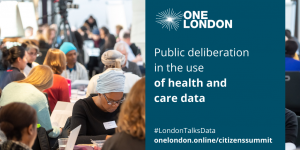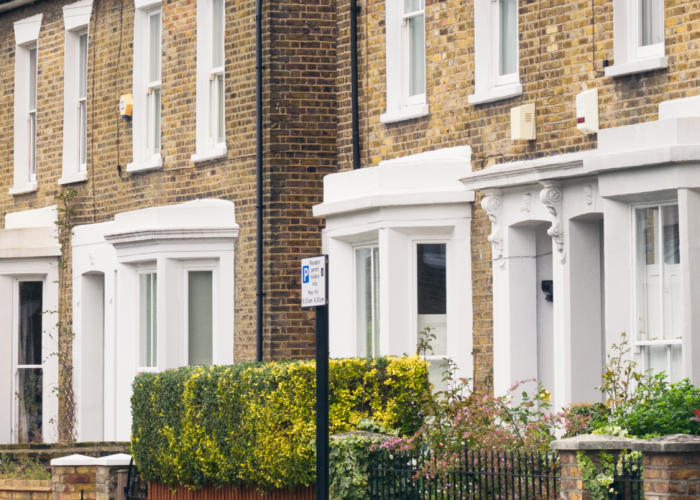 Londoners have set a clear mandate to health and care leaders for how they expect their data to be used, with strong endorsement for joining-up health and care data to support individual care as well as proactive care, service planning and research as long as certain conditions are in place.
Londoners have set a clear mandate to health and care leaders for how they expect their data to be used, with strong endorsement for joining-up health and care data to support individual care as well as proactive care, service planning and research as long as certain conditions are in place.
In receiving the detailed recommendations, formed through the OneLondon Citizens’ Summit, national and local leaders confirmed that these public expectations will be used to shape policy for the region. This is vital to ensure that Londoners have trust and confidence in how health and care data is used.
The OneLondon Citizens’ Summit was a large scale and in-depth public deliberation on uses of health and care data. It involved 100 Londoners in a four-day process of detailed discussion and debate, with technical information provided by experts and practitioners. Participants were recruited to be reflective of London’s diverse population, recruited from across all 32 boroughs, and with a mix of attitudes towards data sharing.
The work was overseen by an independent advisory group. This Citizens’ Summit exemplifies a new and innovative way to involve the public in trustworthy policymaking. As a result, Londoners have had more opportunity than ever before to be informed about the issues and trade-offs, and to set out their expectations about the uses of their health and care information by the health and care system.
The Citizens’ Summit was commissioned by London’s five health and care partnerships via the OneLondon Local Health and Care Record Exemplar (LHCRE) programme, and delivered by Ipsos MORI and The King’s Fund, supported by Professor Graham Smith from the University of Westminster. Through public deliberation, London is leading the way in understanding how citizens weigh-up the benefits and potential concerns of data use, to reach an informed set of public expectations that will now shape the development of policy across the capital.
London’s Chief Digital Officer, Theo Blackwell, said:
“There is huge potential to harness health and care data in a safe and secure way, in order to improve Londoners’ wellbeing while protecting their privacy. The Mayor and I are clear that Londoners must be at the heart of shaping how their data is used and by whom. The OneLondon Citizens’ Summit has empowered Londoners to make recommendations on this important issue, to ensure the system can develop policy in a trustworthy way.”
How do Londoners expect their health and care data to be used?
- Access and control in health and care data
At the end of the process, after four days of deliberation, there was almost unanimous agreement (97% of those who attended on the day)* that all health and care organisations in London should join up identifiable data to support the provision of care to individuals. An expectation was set that health and care professionals would only have access to information relevant to their roles through a means of role-based access control. Strict conditions were set out by Summit participants, taking into account the level of urgency of a patient’s condition, safeguarding of information and accountability.
- Use of de-personalised data for health and care planning and improvement
Participants recommended that de-personalised data must be used by relevant organisations to plan and improve services and demonstrably benefit the health of the population, with conditions set out to ensure security of data, transparency of access, and an individual’s choice to opt out of this use if they wish.
- Use of de-personalised data for research and development
Conditions for using de-personalised data to support research and development included who should have access (including commercial organisations) and how they should be charged for this access, with a tiered pricing model being suggested. Participants also set conditions around how information should be safeguarded and accessed in a safe and secure setting, and how benefits – financial and otherwise – should be realised and distributed across the NHS.
- Governance and oversight
There was a strong expectation set that citizens are involved in ongoing policy and decision-making around the uses of health and care data as part of a continuing diverse citizens’ advisory group, with a request for those in elected positions, for example, the London Assembly, to play an oversight and scrutiny role.
- Consistency across London
After four days of deliberation, nearly all of the participants (98% of those who attended on the day)* stated an expectation that all health and care organisations in London must join up de-personalised information, as part of a population dataset, to support proactive care, planning, improvement, research and development in line with the recommendations and conditions they set out.
A participant involved in the Citizens’ Summit, commented:
“Certain expectations that I had of the NHS and our data were completely blown out of the park. Connections I thought might be there – or hoped were there – weren’t. So it’s been very informative. I came in initially with the view that, ‘the data is mine, no one should have access to it’, so I’ve done a big flip. It’s been a journey because I’ve kept flipping to and fro.”
What does this mean for London’s health and care system?
Data collected about a person’s health and care offers a range of benefits – from helping NHS and care staff to provide safe, quality care, to planning and improving services, to supporting research and discovery of new treatments. The public health emergency of the Covid-19 pandemic has highlighted more than ever the need for a joined-up approach in using data, both now and into the future. This is an expectation shared by Londoners, and the recommendations formed by participants through the Citizens’ Summit provide a clear directive to the health and care system.
Dr Vin Diwakar, Regional Medical Director for the NHS in London, commented:
“Having listened to Londoners about how they expect their personal health information to be used, it is clear they want those treating patients to have access to all the health and care information for those individuals, to optimise care. They also strongly support using data for research and the clear benefit of improving the city’s health and social care. Privacy and other safeguards must be in place. We are grateful for the involvement of all those who took part and will continue to work closely with Londoners as we look to develop an agreed set of principles for how we safely and securely use Londoners’ data, based on their recommendations.”
Recommendations and findings from the OneLondon Citizens’ Summit are detailed in a new report published today. Download Public deliberation in the use of health and care data here.
All materials and stimulus used in the Citizens’ Summit are publicly available to download, use and share. Visit www.onelondon.online/citizenssummit.
END
Notes for Editors:
*Figures in the release are included as an illustration of the strength of opinion amongst OneLondon Citizens’ Summit participants and should not be extrapolated to the entire population of Londoners. These questions were posed to Summit participants on Day 4 following a significant period of information-giving and deliberation.
About the OneLondon Citizens’ Summit
- The OneLondon Citizens’ Summit on uses of health and care data took place over two weekends earlier this year: 1-2 February and 29 February-1 March
- The OneLondon Citizens’ Summit was commissioned by the OneLondon Local Health and Care Record Exemplar (LHCRE). It was delivered by Ipsos MORI in partnership with The King’s Fund, supported by Professor Graham Smith
- The OneLondon Citizens’ Summit was attended by around 100 participants, recruited to be reflective of London’s diverse population and to involve people with a range of attitudes towards data sharing (positive, neutral, cautious)
- The Summit was supported by a workshop with marginalised and vulnerable communities to understand their views and feed them into the recommendations
- A full report and recommendations from the Summit is available to download here. All materials and stimulus used in the Summit, along with video recordings of all expert presentations are available at www.onelondon.online/citizenssummit
- Watch a highlights video of the Citizens’ Summit, including participants’ feedback, here.
- Recommendations from the OneLondon Citizens’ Summit in full:
Access and control in health and social care
We expect health and care data to be accessed and used by those who need information to perform their role, with the following conditions:
- A senior person or group should authorise the level of data a staff member can access, for a small number of categories (three to five)
- Data should only be accessed on a need to know basis, which needs to take into account the level of urgency/threat posed and vulnerability of the patient
- Safeguards should be applied, including:
- Background checks for any staff being given access
- Mandatory training on induction, repeated regularly, and checked
- Additional safeguards, e.g. passwords, contracts, confidentiality agreements, appraisals
- There should be accountability, including:
- Serious consequences for misuse (deterrents, penalties, sanctions), for the individual and the organisation
- Checks and an audit trail should be built in to find out who is looking at which data, and this should be reviewed regularly
- There should be mechanisms for raising concerns e.g. whistle-blowing policy
- Vital information flagged and available to all, e.g. allergies to medication, end of life care decisions
Use of de-personalised data for planning and improvement
De–personalised health and care data must be shared and used by relevant bodies to plan and improve services and demonstrably benefit health in London.
Conditions:
- Ensure the data being shared is accurate
- All parties must sign up to the ‘five safes’ in order to access/use data
- Data is shared for an agreed purpose (not for general analysis)
- Only data relevant to the specific analysis are shared
- Shared data must be held securely by all agreed recipients
- Maintain the national ‘opt out’ option, but also provide an option to opt ‘back in’
- There should be legal penalties for misuse of the data (e.g. selling on to ‘third parties’)
- The organisations that are sharing/using the data should be stated and published somewhere for the public to see
- There should be a defined process for sharing the data that is published somewhere for the public to see
Use of de-personalised data for research and development – data safeguards, and fair and productive partnerships
We expect a fair and productive partnership to meet the following conditions:
Benefits
- To be shared with NHS including: shared Intellectual Property, royalties, stake (in companies), profits and outputs (new drugs discount)
- To be shared across the NHS – to avoid inequalities (starting with London first), maintain British values and the principle of the NHS
Charges
- NHS to recover maintenance/usage costs as a minimum
- NHS to charge for access to data (not selling data) – for a time-limited period and/or license access to data
- Differential charging (reviewed every year) – tiered charges based on turnover and profit-making (e.g. start-ups, charities, universities, pharmaceutical companies may be charged relative to their turnover and potential to make a profit)
Transparency
- NHS to produce a publicly available annual report (in plain English) detailing who has accessed and uses data (and why), the impact of the research undertaken, and distribution of any financial benefits to the NHS
- NHS to publish criteria for vetting potential partners – what is the process they need to go through to obtain access (e.g. for charities, commercial companies, universities)
Other
- The ‘five safes’ model must be reviewed regularly – checking legal and regulatory frameworks that underpin the five safes
- No access to data will be granted to insurance companies
- All accepted research proposals should demonstrate that they are in the public interest
Ongoing roles in policy development
We expect that there are several ways that the public are involved in ongoing policy development:
- There should be a diverse citizens’ advisory group where people are recruited to be reflective of London (i.e. similar to the OneLondon Citizens’ Summit), with a lower age limit (17 years), supported with the right information to understand the issues
- Two or three citizen representatives should also sit on decision-making boards with people who work in health and care and experts, and they need to be recruited (i.e. similar to how school governors are recruited) with the skills needed to take part
- These roles should be time-limited (and replaced every three years)
Ongoing roles in governance and oversight
We expect there to be trustworthy oversight of the system of joining-up and using health information, which would include:
- Experts playing a lead role in making detailed decisions
- With additional roles for experts from health and care professions, scientists, and cyber security experts, as well as people with a range of other backgrounds who might bring creative ideas
- A specific role for a powerful elected representative at the London level, supported by the right expert advise to hold the system to account, and a role for the London Assembly
- Make sure the accountability process is transparent for all Londoners (should they wish to see)
Consistency across London
After four days of deliberation, Summit participants were asked the following questions. These figures should not be extrapolated to the entire population of Londoners.
Question one: Should all health and care organisations across London follow the recommendations we have developed today (data use for planning and in research), or should they each have the power to make their own decisions about how to use their patients’ data?
| % of Summit participants | |
| 1. We expect there to be a single set of policies (‘rules of the road’) across all health and care organisations in London | 87% |
| 2. We expect the policies (‘rules of the road’) to be set at the level of the five sub-regional areas in London | 11% |
| 3. We expect the organisations to make their own policies (‘rules of the road’) around information sharing | 2% |
Question two: To what extent do you agree or disagree with the following statement: “We expect all health and care organisations in London to join-up identifiable information to support the provision of care to individuals, with staff seeing information relevant to their roles through some sort of role-based access control.”
| % of Summit participants | |
| 1. Strongly agree | 76% |
| 2. Agree | 21% |
| 3. Disagree | 3% |
| 4. Strongly disagree | 0% |
Question three: To what extent do you agree or disagree with the following statement: “We expect all health and care organisations in London to join-up de-personalised information, as part of a population dataset, to support proactive care, planning and research and development.”
| % of Summit participants | |
| 1. Strongly agree | 70% |
| 2. Agree | 28% |
| 3. Disagree | 0% |
| 4. Strongly disagree | 2% |
About OneLondon
- The OneLondon LHCRE programme is a partnership of NHS organisations and local government across London, working together with citizens to transform London’s health and care services by joining up information to support fast, effective and safe care
- The OneLondon partnership comprises London’s five Sustainability and Transformation Partnerships (STPs) and London’s three Academic Health Science Networks (AHSNs). It is supported by the Greater London Authority and London Councils
- More information about OneLondon’s public engagement programme and Conversation with Londoners is available at www.onelondon.online
Media enquiries and further information
- A full briefing on the OneLondon Citizens’ Summit is available for press and media use
- Media enquiries, including requests for interviews, should be directed through the OneLondon communications and engagement team. The following individuals are available for further comment and interviews:
| Name | Role/relevance to OneLondon Citizens’ Summit |
| Theo Blackwell MBE | London’s Chief Digital Officer |
| Amy Darlington | OneLondon Engagement Lead |
| Dr Vin Diwakar | Regional Medical Director for the NHS in London, OneLondon SRO |
| Dr Jonty Heaversedge | OneLondon Clinical Lead, GP in South East London |
| Mark Kewley | OneLondon Director of Strategy |
| Ben Page | Chief Executive, Ipsos MORI |
| Luke Readman | Director of Digital Transformation for London, OneLondon Chief Officer |
- For more information, contact Rebekah Tailor, Head of Communications for OneLondon: 07414 602666 or email rebekah.tailor@uclpartners.com



